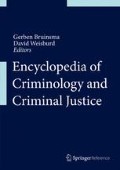Access this chapter
Tax calculation will be finalised at checkout
Purchases are for personal use only
Recommended Reading and References
Beaver KM, Wright JP (2007) Stability of low self-control from Kindergarten through first grade. J Crime Justice 30:63–86
Burt CH, Simons RL, Simons LG (2006) A longitudinal test of the effects of parenting and the stability of self-control: negative evidence for the general theory of crime. Criminology 44:353–396
Cochran JK, Wood PB, Sellers CS, Wilkerson W, Chamlin MB (1998) Academic dishonesty and low self-control: an empirical test of a general theory of crime. Deviant Behav 19:227–255
Cohen LE, Felson M (1979) Social change and crime rate trends: a routine activity approach. Am Sociol Rev 44:588–608
Feldman SS, Weinberger DA (1994) Self-restraint as a mediator of family influences on boys’ delinquent behavior: a longitudinal study. Child Dev 65:195–211
Franklin CA (2011) An investigation of the relationship between self-control and alcohol induced sexual assault victimization. Crim Justice Behav 38:263–285
Gibbs JJ, Giever D, Martin JS (1998) Parental management and self-control: an empirical test of Gottfredson and Hirschi’s general theory. J Res Crime Delinq 35:40–70
Gottfredson D (2001) Schools and delinquency. Cambridge University Press, Cambridge
Gottfredson MR, Hirschi T (1990) A general theory of crime. Stanford University Press, Palo Alto
Hay C (2001) Parenting, self-control, and delinquency: a test of self-control theory. Criminology 39:707–736
Hay C, Forrest W (2006) The development of self-control: examining self-control theory’s stability thesis. Criminology 44:739–774
Hay C, Fortson E, Hollist D, Altheimer I, Schaible L (2006) The Impact of community disadvantage on the relationship between the family and juvenile crime. J Res Crime Delinq 43:326–356
Hindelang MJ, Gottfredson MR, Garofalo J (1978) Victims of personal crime. Ballinger, Cambridge
Hirschi T (2004) Self-control and crime. In: Baumeister RF, Vohs KD (eds) Handbook of self-regulation: research, theory, and application. Guilford, New York
Hirschi T, Gottfredson MR (2001) Self-control theory. In: Paternoster R, Bachman R (eds) Explaining criminals and crime. Roxbury, Los Angeles
Holtfreter K, Reisig MD, Pratt TC (2008) Low self-control, routine activities, and fraud victimization. Criminology 46:189–220
Lauritsen JL, Sampson RJ, Laub JH (1991) The link between offending and victimization among adolescents. Criminology 29:265–292
McGloin JM, Pratt TC, Piquero AR (2006) A life-course analysis of the criminogenic effects of maternal cigarette smoking during pregnancy: a research note on the mediating impact of neuropsychological deficit. J Res Crime Delinq 43:412–426
Muravin M, Pogarsky G, Shmueli D (2006) Self-control depletion and the general theory of crime. J Quant Criminol 22:263–277
Perrone D, Sullivan C, Pratt TC, Margaryan S (2004) Parental efficacy, self control, and delinquent behavior: a test of a general theory of crime on a nationally representative sample. Int J Offender Ther Comp Criminol 48:298–312
Polakowski M (1994) Linking self- and social control with deviance: illuminating the structure underlying a general theory of crime and its relation to deviant identity. J Quant Criminol 10:41–78
Pratt TC (2009) Reconsidering Gottfredson and Hirschi’s general theory of crime: linking the micro- and macro-level sources of self-control and criminal behavior over the life course. In: Savage J (ed) The development of persistent criminality. Oxford University Press, New York
Pratt TC, Cullen FT (2000) The empirical status of Gottfredson and Hirschi’s general theory of crime: a meta-analysis. Criminology 38:931–964
Pratt TC, Turner MG, Piquero AR (2004) Parental socialization and community context: a longitudinal analysis of the structural sources of low self-control. J Res Crime Delinq 41:219–243
Reisig MD, Pratt TC (2011) Low self-control and imprudent behavior revisited. Deviant Behav 32:589–625
Schreck CJ (1999) Criminal victimization and low self-control: an extension and test of a general theory of crime. Justice Q 16:633–654
Schreck CJ, Stewart EA, Fisher B (2006) Self-control, victimization, and their influence on risky lifestyles: a longitudinal analysis using panel data. J Quant Criminol 22:319–340
Tittle CR, Ward DA, Grasmick HG (2004) Capacity for self-control and individuals’ interest in exercising self-control. J Quant Criminol 20:143–172
Turanovic JJ, Pratt TC (2013a) The consequences of maladaptive coping: integrating general strain and self-control theories to specify a causal pathway between victimization and offending. J Quant Criminol (onlinefirst)
Turanovic JJ, Pratt TC (2013b) “Can’t stop, won’t stop”: self-control, risky lifestyles, and repeat victimization. J Quant Criminol (onlinefirst)
Turner MG, Piquero AR, Pratt TC (2005) The school context as a source of self-control. J Crim Justice 33:327–339
Unnever JD, Cullen FT, Pratt TC (2003) Parental management, ADHD, and delinquent involvement: reassessing Gottfredson and Hirschi’s general theory. Justice Q 20:471–500
Wright JP, Beaver KM (2005) Do parents matter in creating self-control in their children? A genetically-informed test of Gottfredson and Hirschi’s theory of low self-control. Criminology 43:1169–1202
Author information
Authors and Affiliations
Corresponding author
Editor information
Editors and Affiliations
Rights and permissions
Copyright information
© 2014 Springer Science+Business Media New York
About this entry
Cite this entry
Pratt, T.C., Turanovic, J.J. (2014). General Theory of Crime. In: Bruinsma, G., Weisburd, D. (eds) Encyclopedia of Criminology and Criminal Justice. Springer, New York, NY. https://doi.org/10.1007/978-1-4614-5690-2_357
Download citation
DOI: https://doi.org/10.1007/978-1-4614-5690-2_357
Published:
Publisher Name: Springer, New York, NY
Print ISBN: 978-1-4614-5689-6
Online ISBN: 978-1-4614-5690-2
eBook Packages: Humanities, Social Sciences and Law

